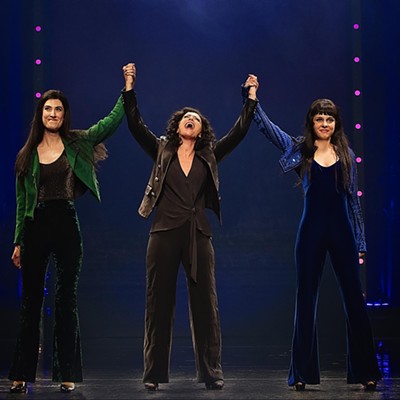Describe This Movie Using One The Godfather: Part III Quote:
MICHAEL CORLEONE: Just when I thought I was out ... they pull me back in.Brief Plot Synopsis: Elderly hitman recalls his hits, man.
Rating Using Random Objects Relevant To The Film: 4 lone gunmen out of 5.
Tagline: "Time changes nothing."
Better Tagline: "Don't hassle the Hof(fa)."
Not So Brief Plot Synopsis: Frank Sheeran (Robert De Niro) started off as a humble truck driver, but after crossing paths with mob boss Russell Bufalino (Joe Pesci), he starts doing jobs (and hits) for Bufalino's crime family. Sheeran is introduced to Teamsters President Jimmy Hoffa (Al Pacino) and soon becomes his right-hand man. But when Hoffa decides to take on his Teamster successor's habit of freely lending money to the Mafia, Sheeran finds his loyatlies tested.
"Critical" Analysis: When it was announced Martin Scorsese was getting the band back together for his new movie, an adaptaion of Charles Brandt's I Heard You Paint Houses, plenty of questions were raised: did the director have it in him to do one last mob epic? Could Pacino conjure up another great performance? Would De Niro and Pesci be able to recapture their old chemistry? After seeing The Irishman, the answer is, "Are you serious? Get the f___ outta here."
In his latest, Scorsese emphatically closes the door on the mob movie genre he redefined and more or less perfected. Returning to the working class perspective he favored in Mean Streets, the film offers a grittier take of life in the rackets than his more recent efforts, but all the themes are still there: loyalty, brotherhood, guilt, and the how much harder it is to rationalize our actions as we get older.
And while it's constantly a part of movies about organized crime, the grim specter of death lurks over The Irishman more than usual. It isn't just Frank recounting his deeds from his death
On that note, it's hard to take seriously criticisms that claim Scorsese has ever glorified the "mob lifestyle." Henry Hill might have bought "the most expensive tree they had" after the Lufthansa heist, but that was just to highlight his own stupidity. Likewise, there's no glamour in watching Jo Hoffa terrified to turn the ignition key in her car, or glory in being gunned down in a diner in front of your wife and kid like "Crazy" Joe Gallo. Wiseguys only live to embarrass themselves on the stand, while feared bosses eventually have to moisten their bread to eat it with their dentures.
These people know they're ending up bleeding out in the street, or blown up, or naked in the trunk of a car. If they're "lucky," they die in prison. Scorsese doesn't veer from any of this, and if there's an argument to the contrary to be made, it's that Scorsese and longtime editor Thelma Schoonmaker present the events leading up to their inevitable demises with such skill and fluidity it passes for glorification.
De Niro shows the the razor's edge Frank walks between Hoffa, increasingly defiant of the Mafia's influence in the unions, and Bufalino and his associates, whose patience with the Teamster leader grows dangerously thin. If there's a complaint, it's that he's too reserved, which isn't helped by the omnipresent de-aging technology.
It's hard not to chuckle anytime Russell refers to Frank as "kid," or wince when an ostensibly 30-somethinbg Frank curb stomps a guy while looking very much like a 76-year old. Pesci doesn't suffer as much, as Russell comes across as an old man from the get go. And he can still say more with one pointed look than the majority of actors can with two pages of dialogue.
Pacino is a revelation here, which sounds incredibly stupid when you say it out loud. Perhaps the most celebrated actor of the 1970s (yet given a lifetime achievement Oscar for the kind of braying caricature that would mark so much of his later work), Pacino's Hoffa is superbly audacious, and the source of much of the film's humor (his trying to convince Frank he didn't mean him when he called an entire room of people "idiots" is fantastic).
The Irishman isn't Scorsese's last movie (he still has Killers of the Flower Moon coming up), but if it was, it would be both a fitting end to a decades-long cycle of gangster movies, and quite a high note on which to end a career. Methodical, lyrical, and powerful, it earns (almost) every minute of its three-and-a-half hour running time.








